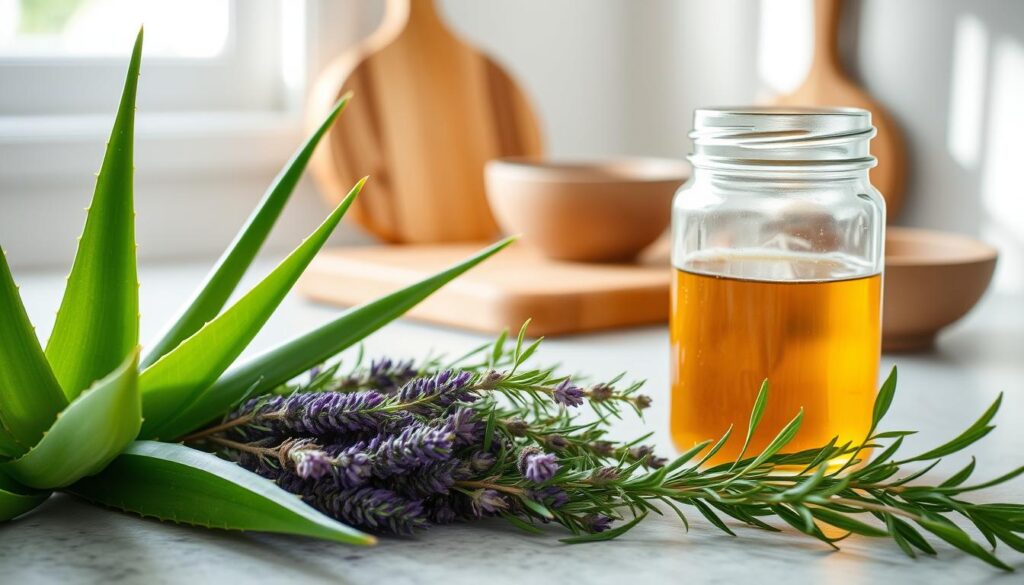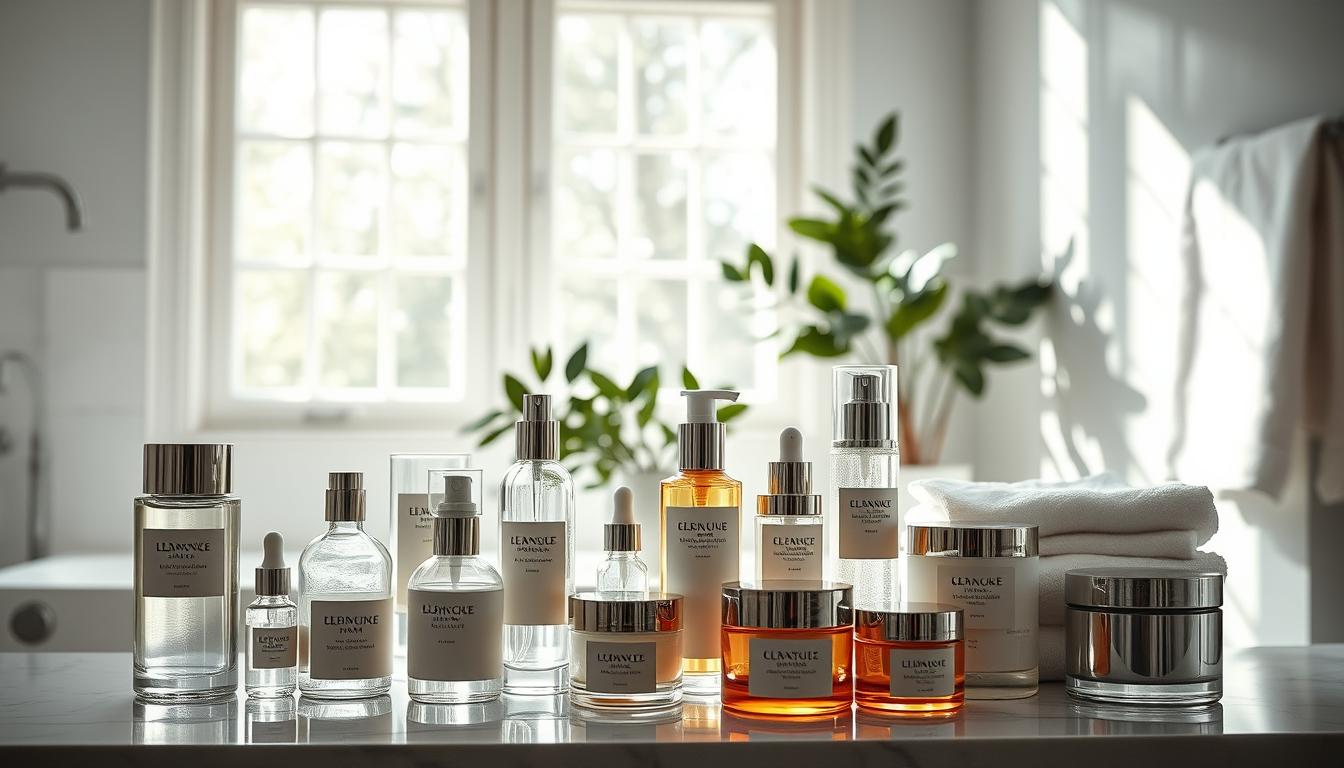Are you tired of dull, dry skin? Do you dream of having a radiant, glowing complexion? Dr. Hannah Kopelman, a Dermatologist at DermOnDemand, says your skincare routine is key to healthy, youthful-looking skin.
A good skincare routine can make your skin glow. We’ll look at the best ways to get the skin you want in this article.
Key Takeaways
- Understand your skin type to create a tailored skincare routine
- Exfoliate regularly to remove dead skin cells
- Use products containing natural ingredients for optimal nourishment
- Stay hydrated to maintain healthy, youthful-looking skin
- Protect your skin from the sun’s harsh rays
Understand Your Skin Type for Better Care
To get healthy, youthful-looking skin, knowing your skin type is key. There are four main types: normal, dry, oily, and combination.
Normal skin is balanced, neither too oily nor too dry. It’s the best skin type. Keeping it healthy is easy with the right skincare.
Oily skin looks shiny, mainly in the T-zone. It’s more likely to get blackheads and acne because of too much oil.
Dry skin feels tight and flaky because it lacks moisture. Keeping it hydrated is vital to avoid dryness and irritation.
Combination skin is a mix of oily and dry. The T-zone is oily, while the cheeks are dry. Knowing your skin type helps choose the right products for healthy, glowing skin.
Essential Bathing Practices for Hydration
Keeping your skin hydrated is key for a glowing look. It’s important to know how water temperature and product choice affect your skin.
Hot water can dry out your skin, causing irritation. Warm water is better, as it’s gentler. Also, pick cleansers that match your skin type.
Following these tips can keep your skin looking healthy and hydrated.
Exfoliation: The Key to Renewed Skin
To get smoother, brighter skin, you need to exfoliate. Exfoliation gets rid of dead skin cells, making your skin look better. Deanna Manganaro, a Medical Esthetician at RN Esthetics, says using a scrub or dry brush can make your skin look smoother.
Benefits of Exfoliating Regularly
Exfoliating often makes your skin look better. It helps hide fine lines and wrinkles, making you look younger. It also makes your skin tone and texture better, which is key for anti-aging skincare.
Exfoliating lets your skincare products work better. This is important for the best skin rejuvenation.
Chemical vs. Physical Exfoliation
There are two ways to exfoliate: chemical and physical. Physical exfoliation uses tools to remove dead skin cells. Chemical exfoliation uses acids to break down dead skin cells.
What you choose depends on your skin. If you have sensitive skin, chemical exfoliation might be better. But if you have stubborn dead skin cells, physical exfoliation is more effective.
Best Exfoliating Ingredients to Look For
When picking an exfoliator, look for ingredients that are good but gentle. AHAs like glycolic acid and lactic acid help with cell turnover and hydration. BHAs, like salicylic acid, help with clogged pores and inflammation.
Natural ingredients like sugar, salt, and ground almonds are good for physical exfoliation. But be careful not to exfoliate too much, as it can dry out your skin.
Moisturizing: Locks in the Goodness
Moisturizing is key in any skincare routine. It keeps moisture in, shields the skin from harm, and keeps the skin’s natural barrier strong.
Importance of Moisturizing
Moisturizing does a lot for your skin:
- It keeps moisture in and stops dryness
- It protects the skin from the outside world
- It makes the skin more elastic and lessens fine lines and wrinkles
When picking a moisturizer, think about your skin type. Look for ones with natural stuff like aloe vera, coconut oil, or shea butter.
Sun Protection: Shielding Your Skin
Keeping your skin safe from the sun is key to looking young. The sun’s UV rays can cause wrinkles and dark spots early. Using the right protection can greatly lower these risks.
The Importance of Sunscreen
Sunscreen is a must in your skincare routine. The Mayo Clinic Staff says using a broad-spectrum sunscreen with at least SPF 30 daily can prevent dark spots and wrinkles. This simple step can greatly help keep your skin healthy and looking good.
Choosing the right sunscreen means knowing your skin type and picking the right product. If you have sensitive skin, look for sunscreens that are “hypoallergenic” or “fragrance-free.”
If Using Makeup With SPF Is Enough
Makeup with SPF offers some protection, but it’s not enough alone. The amount used is often not enough to match the SPF value. So, it’s best to use a dedicated sunscreen under your makeup.
Layering your skincare products right ensures you get the best from both sunscreen and makeup. Put sunscreen on first, then let it soak in before applying makeup.
Reapplying Sunscreen Throughout the Day
Reapplying sunscreen is as important as applying it the first time. UV rays can harm your skin all day, even on cloudy days. Reapply every two hours or right after swimming or sweating.
- Use a broad-spectrum sunscreen with an SPF of at least 30.
- Apply sunscreen 15-30 minutes before going outdoors.
- Reapply every two hours or after swimming or sweating.
By adding these sun protection tips to your daily routine, you can have healthier, more resilient skin. Remember, protecting your skin from the sun is a simple yet effective way to keep your skin glowing and youthful.
Bath & Body Ingredients to Look For
The ingredients in bath and body products really matter. Natural stuff like coconut oil, shea butter, and essential oils are great. They help keep your skin healthy and protected.
Here are some top natural ingredients to search for:
- Coconut oil: rich in antioxidants, hydrates and nourishes the skin
- Shea butter: moisturizes and protects the skin
- Aloe vera: soothes and calms the skin
- Vitamin E: antioxidant properties help protect the skin from damage
When you’re buying bath and body products, choose ones that say “natural” or “organic.” These are less likely to have harsh chemicals or artificial smells. These can irritate your skin.
The Role of Diet in Skin Health
Your diet plays a big role in how healthy your skin looks. Eating foods full of good nutrients can make your skin look better. It can even make wrinkles less noticeable and improve how your skin feels.
Foods That Promote Healthy Skin
Some foods are better for your skin than others. Foods packed with antioxidants like berries and leafy greens fight off damage to skin cells. Foods with omega-3 fatty acids, like salmon and walnuts, also help by reducing inflammation.
- Berries (blueberries, strawberries, raspberries)
- Leafy greens (spinach, kale, collard greens)
- Nuts and seeds (walnuts, chia seeds, flaxseeds)
- Fatty fish (salmon, sardines, mackerel)
Hydration and Its Effects on Skin
Drinking enough water is key for keeping your skin elastic and smooth. Water helps remove toxins and keeps your skin moist. Try to drink at least eight glasses of water a day for better skin.

Supplements for Skin Radiance
Some supplements can also boost your skin’s glow. Vitamin C brightens your skin, and omega-3 fatty acids support its health. But, always talk to a doctor before taking any supplements.
- Vitamin C supplements for brightening
- Omega-3 fatty acid supplements for skin health
- Probiotics for gut health, which can indirectly benefit skin
The Impact of Lifestyle on Skin Appearance
Your skin shows how healthy you are. Simple lifestyle changes can make a big difference. Getting enough sleep, eating well, and managing stress are key for glowing skin.
Sleep: The Foundation of Healthy Skin
Sleep is vital for your skin. It helps your body fix damaged cells and boosts your immune system. Not enough sleep can make your skin look dull and worsen skin problems.
Stress Management Techniques
Too much stress harms your skin. Activities like meditation or yoga can help. They make your skin look better by reducing stress.
Changing your lifestyle can greatly improve your skin. Focus on your sleep, diet, and stress levels. Taking care of these can lead to healthier, brighter skin.
Home Remedies for Enhanced Skin Care
Home remedies are a natural way to improve your skin. They use simple, natural ingredients to make your skin healthier and more radiant. This approach avoids harsh chemicals.
DIY Masks for Different Skin Types
Making your own DIY masks at home is fun and effective. For dry skin, a honey and avocado mask provides deep hydration. Sara Millecam suggests using herbal products like colloidal oatmeal for soothing and nourishment.
Here are some simple recipes for different skin types:
- Dry Skin: Mix 1 ripe avocado with 1 tablespoon of honey and 1 tablespoon of olive oil.
- Oily Skin: Combine 1 tablespoon of clay powder with 1 tablespoon of apple cider vinegar and a few drops of tea tree oil.
- Sensitive Skin: Blend 1 tablespoon of aloe vera gel with 1 tablespoon of cucumber juice.

Using Herbal Products Effectively
Herbal products are great for your skincare routine. Essential oils like lavender and chamomile calm and soothe the skin. Always patch test herbal products to avoid any bad reactions.
“Using herbal products like colloidal oatmeal and essential oils can help soothe and nourish the skin,” says Sara Millecam, highlighting the importance of natural ingredients in skincare.
The Benefits of Regular Massages
Regular massages boost your skincare by improving blood flow and reducing stress. They help with lymphatic drainage, which reduces puffiness and evens out your skin tone.
To incorporate massages into your routine:
- Use a gentle, circular motion to massage your face and neck.
- Apply a nourishing oil or cream to enhance the massage.
- Massage for at least 5 minutes to see noticeable benefits.
Seasonal Skin Care Adjustments
Seasonal changes can greatly affect your skin’s health. It’s important to change your skincare routine with the seasons. As the weather changes, so do your skin’s needs.
How Weather Changes Skin Needs
Different weather can impact your skin in many ways. Cold weather can dry out your skin. Hot weather can make your skin produce more oil.
- Cold Weather: Use richer moisturizers to combat dryness.
- Hot Weather: Opt for lightweight, oil-free products to control shine.
Tips for Summer Skin Care
Summer brings challenges like more sun and heat. To keep your skin healthy and glowing:
- Use a broad-spectrum sunscreen with at least SPF 30 daily.
- Stay hydrated by drinking plenty of water.
- Exfoliate regularly to remove dead skin cells.
Tips for Winter Skin Care
Winter skin care is all about fighting dryness and keeping moisture. To keep your skin healthy and youthful in winter:
- Use a humidifier to add moisture back into the air.
- Apply a rich moisturizer immediately after bathing.
- Avoid harsh products that can strip your skin of its natural oils.
By changing your skincare routine with the seasons, you can keep your skin glowing. This supports your anti-aging skincare efforts. Remember, being proactive and adjusting your routine with the weather is key.
Building a Relaxing Bath Routine
Creating a relaxing bath routine can help you unwind and feel better. By adding a few simple steps, your bath time can become a refreshing experience. It leaves you feeling calm and refreshed.
Creating a Soothing Atmosphere
To start, make your bath area inviting. Adjust the lighting and temperature to your liking. Adding ingredients like colloidal oatmeal or oils to your bath water can nourish and relax your skin, as Dr. Kopelman suggests.
For more tips on taking a great bath, check out GQ’s guide on how to take a really good bath. It’s a great way to enhance your skincare routine and get healthy, youthful-looking skin.
Enhancing Relaxation
Adding bath accessories like candles, bath salts, or essential oils can make your bath even more relaxing. Aromatherapy is key in reducing stress and promoting relaxation. It’s a great addition to your bath routine.
By prioritizing bath time and following these tips, you can enjoy the best bath and body tips. You’ll wake up feeling refreshed and revitalized.
FAQ
What is the best way to determine my skin type?
Knowing your skin type is key to picking the right skincare. Watch how your skin acts all day. If it’s oily, dry, or a mix, you’ve got oily, dry, or combo skin. Normal skin is smooth and even.
How often should I exfoliate my skin?
Exfoliating gets rid of dead skin cells and boosts cell renewal. How often you exfoliate depends on your skin. Most people exfoliate once to three times a week. But if your skin is sensitive, do it less.
What are the benefits of using natural oils in skincare?
Natural oils are full of antioxidants and essential fatty acids. They nourish and protect your skin. They keep moisture in, reduce inflammation, and help your skin stay healthy. Coconut, olive, and jojoba oils are popular choices.
Can I rely on makeup with SPF for sun protection?
Makeup with SPF offers some sun protection, but it’s not enough. Always use a broad-spectrum sunscreen with a good SPF before makeup.
How can I adjust my skincare routine for different seasons?
Your skin’s needs change with the seasons. In summer, use light, oil-free products to avoid clogged pores. In winter, use richer, moisturizing products to fight dryness. Adjusting your routine to the weather keeps your skin healthy and glowing.
What lifestyle factors can impact skin appearance?
Sleep, stress, and exercise greatly affect your skin. Enough sleep keeps skin functions in check. Stress can cause acne and early aging. Exercise boosts blood flow and improves skin texture.
How can I create a relaxing bath routine?
A relaxing bath routine is great for unwinding and well-being. Add bath accessories, use aromatherapy, and calming essential oils. Prioritizing bath time reduces stress and keeps your skin looking young.
What are some effective home remedies for skin care?
DIY masks, herbal products, and massages can relax and improve skin health. Knowing how to use these remedies well can enhance your skincare routine.
How can I maintain healthy, youthful-looking skin through diet?
A healthy diet is key for youthful skin. Eat foods rich in antioxidants and omega-3s for skin health. Drinking enough water keeps your skin elastic and smooth.

